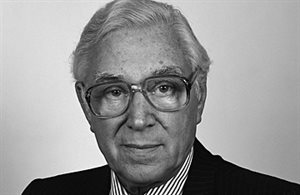 Patrick Steptoe completed his medical studies at St George’s Hospital Medical School after they were interrupted by the Second World War. During his military career he was captured and spent some time as a prisoner of war.
Patrick Steptoe completed his medical studies at St George’s Hospital Medical School after they were interrupted by the Second World War. During his military career he was captured and spent some time as a prisoner of war.
His career in obstetrics and gynaecology began at St George’s before becoming senior registrar at the Whittington Hospital, London and finally consultant at Oldham General Hospital in 1961; in that same year he was also made a fellow of the Royal College of Obstetricians and Gynaecologists.
Steptoe perfected the technique of laparoscopy, or keyhole surgery, to further his research into reproductive health. His expertise helped to improve the reputation of this surgical procedure among his peers, as witnessed by the growing numbers of patients undergoing laparoscopies at his Oldham clinic in the 1960s.
The birth of IVF
Around the same time, a physiologist at Cambridge University named Robert Edwards was carrying out research on a technique to fertilise a human egg within the laboratory whilst Steptoe had pioneered the extraction of human eggs from the ovaries using a laparoscope. Edwards and Steptoe joined forces in 1968 to try to develop a technique of in vitro fertilisation (IVF) to assist infertile couples in having babies.
The combined research and experiments of Steptoe and Edwards took many years to come to fruition and met with much resistance not just from their peers but also from the wider world, with questions around the ethics of their work.
On 25 July 1978 Steptoe and Edwards celebrated the arrival of Louise Brown, born to Steptoe’s patient Lesley Brown, through IVF treatment. Louise’s arrival was the first successful birth by IVF and there was soon a waiting list of thousands of couples hoping to receive the procedure. In 1980 Edwards and Steptoe founded the world's first fertility clinic, Bourn Hall, where Steptoe served as the clinic's director until his death in 1988. To date, as many as four million babies have been born through IVF to parents who were unable to conceive naturally.
Patrick Steptoe was elected a fellow of the Royal Society in March 1987 and awarded the Gold Medal of the British Medical Association. Robert Edwards was awarded the Nobel Prize for their work on the development of IVF in 2010. Steptoe, having passed away in 1988 aged 74, was not eligible, as the Nobel Prize is not awarded posthumously.